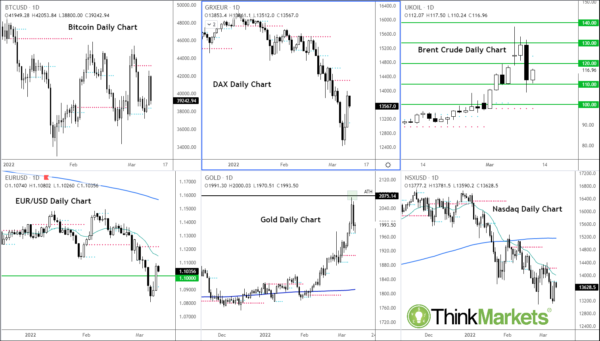- Latest peace talks fail, no progress on ceasefire
- Kuleba: Russia seeks surrender, Ukraine won’t surrender
- Lavrov: Ukraine seems to want to have meetings for the sake of meetings
- Sanctions on Russia pile up: UK freezes assets of Russian oligarchs
- Last US CPI print coming up before the Fed hikes next week
- ECB has a big dilemma
After the big rally for equities and the euro and even bigger plunge for some key commodity prices on Wednesday, there has been a complete lack of follow-through in those moves at the time of writing this Thursday morning. The latest talks between Russia and Ukraine failed to provide breakthrough in ending the war. Markets have reacted in the way you would expect. Later today, we will have the ECB’s decision on monetary policy and press conference, as well as the last US CPI print before the Fed hikes rates next week. While these events may provide some volatility, the focus for the wider markets remains firmly fixated on Russia’s invasion of Ukraine and whether there will be any progress in peace talks in the coming days.
Commodities have rebounded after peace talks failed. Aluminium for example was up 5% and crude oil more than 4% higher, although wheat was down a touch and precious metals flat. European equity indices and US futures fell, with the risk off tone also hurting cryptocurrencies. Bitcoin dropped back below $40K after its big gains the day before. While the moves have so far not been as crazy as those observed earlier in the week, it goes to show that investors are not out of the woods just yet and more extreme volatility could be on the way.
There was a bit of hope that Russia’s Lavrov and Ukraine’s Kuleba would achieve something after starting peace talks in Turkey. But both sides are unwilling to make any major compromises to end the conflict. So, unsurprisingly, there was not progress at conclusion of the talks, which is why risk appetite has been held back so far.
Kuleba has said that they are ready to meet again but added that they cannot stop the war if the country that started it, meaning Russia, has no desire to do so. He added that Russia is seeking a surrender, but Ukraine won’t surrender.
A couple of days ago, Russia had said the aim of its operations do not include overthrowing Ukrainian government and that it would be better if their goals are achieved through talks than military conflict. Talks are indeed always better than going to war, especially if there are no intentions of overthrowing the government. This might be a sign that Russia is blinking. But actions speak louder than words and Russia will have to do more than this. There is also the issue of trust, as this is the same people who told us that the troops on the Ukrainian border returned to base, only to then invade Ukraine shortly after.
Meanwhile, the West are continuing to add sanctions on Russia. Today, the UK government has announced a full asset freeze and travel ban on several of Russia’s oligarchs, whose business empires, wealth and connections are closely associated with the Kremlin. They include:
- Roman Abramovich owner of Chelsea FC and has stakes in steel giant Evraz and Norilsk Nickel
- Oleg Deripaska has stakes in En+ Group
- Igor Sechin is the Chief Executive of Rosneft
- Andrey Kostin is Chairman of VTB bank
- Alexei Miller is CEO of energy company Gazprom
- Nikolai Tokarev is president of the Russia state-owned pipeline company Transneft
- Dmitri Lebedev is Chairman of the Board of Directors of Bank Rossiya
The UK has already announced it will phase out the import of Russian oil and oil products by the end of the year. Don’t forget that the US also decided to launch an all-out economic war against Russia, banning imports of oil and gas from Russia. There will be consequences: high gas prices, even more inflation and retaliation from Russia.
Away from geopolitics, nothing else matters much, although we have the ECB policy decision coming up and the last US CPI inflation print before the Fed hikes rates next week.
US CPI is expected to come in 0.8% month-over-month following a 0.6% rise in January while core CPI is expected to have climbed 0.5% in February. On a year-over-year basis, head CPI is seen rising to 7.9% form 7.5%, while core CPI is expected to climb to 6.4% from 6.0% previously.
It will be interesting to hear how Christine Lagarde and her ECB colleagues will react to the big upsurge in key commodity prices given their conflicting impact on consumer inflation (positive) and the economy (negative).

